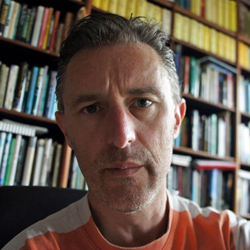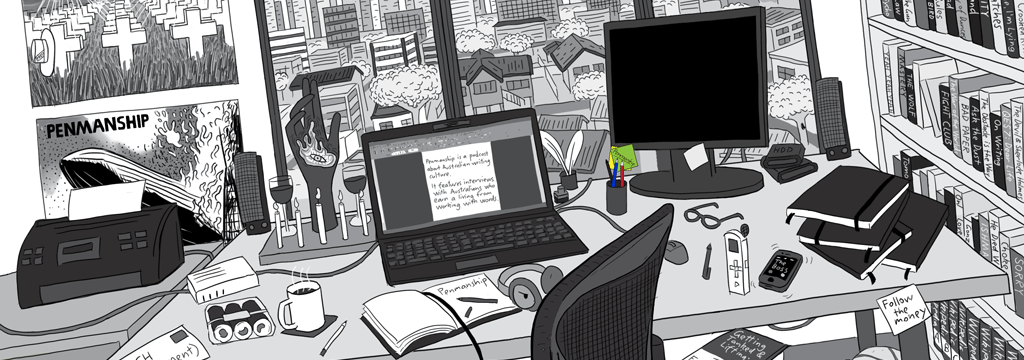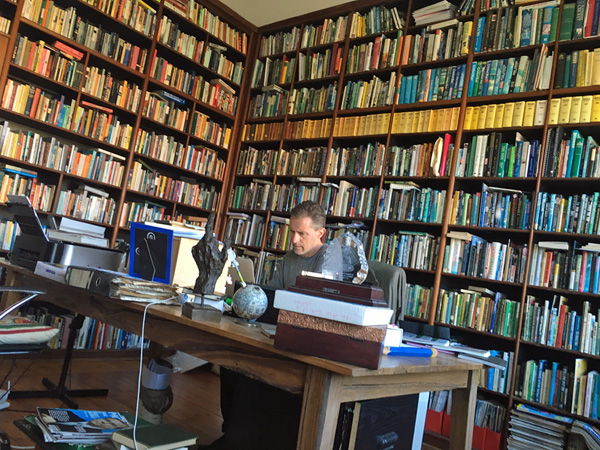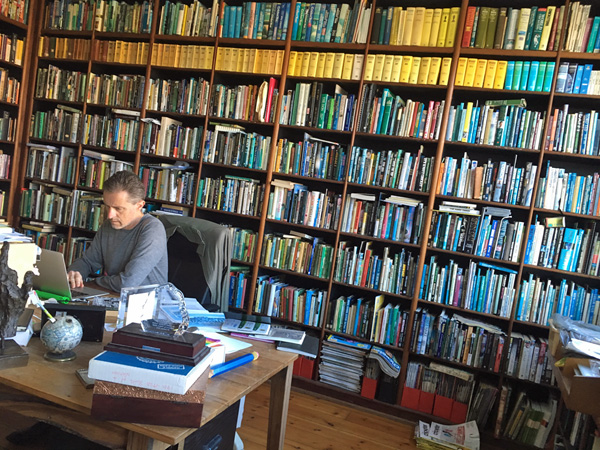Gideon Haigh is an author and freelance journalist.
 Since he began as a cadet journalist at The Age in 1984, fresh out of high school, Gideon’s main subject areas in journalism have been in sport and business. For most of his career, Gideon has worked as a freelancer, and his writing has been published in more than one hundred newspapers and magazines around the world. As an author, he has written 32 books to date, with at least two more underway. The breadth and depth of his body of work is simply astounding, and I’ve been an admirer of his for some time. During the last few years, my main understanding and appreciation of Gideon’s writing is through his role as senior cricket writer at The Australian, where he has become one of the most read and trusted voices in sports journalism.
Since he began as a cadet journalist at The Age in 1984, fresh out of high school, Gideon’s main subject areas in journalism have been in sport and business. For most of his career, Gideon has worked as a freelancer, and his writing has been published in more than one hundred newspapers and magazines around the world. As an author, he has written 32 books to date, with at least two more underway. The breadth and depth of his body of work is simply astounding, and I’ve been an admirer of his for some time. During the last few years, my main understanding and appreciation of Gideon’s writing is through his role as senior cricket writer at The Australian, where he has become one of the most read and trusted voices in sports journalism.
In late July, I met with Gideon at his home in Melbourne’s inner-city, and was led into his writing room, which is also home to his extraordinary collection of thousands of books. Our conversation touches on why he prefers not to think too much about the structure of his books before he starts writing them; how he goes about writing daily cricket match reports for The Australian each summer; how he has managed to avoid becoming cynical about cricket, despite writing about it for decades; how he decides which writing projects to pursue as a freelancer with several sources of income; and how he found himself occupying a sort of public service role in late 2014 as the nation came to terms with the shock death of a young Australian cricketer. The conversation begins, however, with a small discussion about the purpose of this podcast.
Gideon Haigh has been a journalist for more than three decades. He has contributed to more than a hundred newspapers and magazines, published thirty-two books, and edited seven others. He has been writing about sport and business for more than 22 years. His best-known books are Mystery Spinner, The Big Ship, The Summer Game, Game for Anything: Writings On Cricket and A Fair Field and No Favour: The Ashes 2005. His 2012 book The Office: A Hardworking History won the NSW Premier’s Literary Award for Non-Fiction; On Warne was shortlisted for the Melbourne Prize for Literature; and Certain Admissions won the 2016 Ned Kelly Award for True Crime. His latest book is Stroke of Genius: Victor Trumper and the Shot that Changed Cricket. Gideon lives in Melbourne with his wife and daughter. Nobody has played more games for his cricket club – nor, perhaps, wanted to.
Direct download | iTunes | Stitcher | Libsyn | YouTube
Timeline:
3.30 Gideon has been a journalist since 4 February 1984, when he joined The Age after finishing high school; he has never held any other occupation, and has been freelance since 1995 – or as he puts it, “a member of the self-unemployed”
4.30 Gideon’s writing room contains “four walls, mainly consisting of books; two windows, a door, an overburdened desk, a [Mac] Powerbook on the desktop…”
5.30 The wall behind Gideon’s chair consists entirely of cricket books; hundreds of titles on cricket alone, organised in categories devoted to humour, history, different countries, instructional books, annuals, anthologies, biographies and autobiographies in alphabetical order
8.30 “It’s a user’s library; they’re all there because I want to be able to reach for them”
10.30 Gideon’s reading diet tends to get geared toward the projects he’s involved with, but he reads “no contemporary fiction at all. It’s a terrible oversight and admission on my part, but it’s just not where my head’s at”
11.30 Gideon’s reading “is all for pleasure; it’s all completely self-indulgent, but I need to feel that when I’ve finished a book, I will be improved. Better informed. A better reader and writer, as a result”
12.30 Gideon renovated his house in Carlton in 2011, and when he put the books into storage, the removalists told him that his collection of books weighed five tons
13.30 On a Friday in late July, Gideon is writing chapter eight of a true crime book. The crime occurred in the 1920s in Melbourne; he declines to reveal further details due to superstition about the research and writing purpose
15.00 “I do like areas where I don’t know very much; where it’s new and interesting, and challenging”
15.30 After writing 32 books, Gideon says he’s become quite good at selling book proposals, and his body of work also indicates to publishers that he’s going to deliver on what he proposes
16.00 Gideon kept a journal during his late teens and early 20s, but became bored of writing about himself and has never returned to the subject
16.30 Gideon doesn’t outline the structure of his books before he starts writing them; this true crime book is based on a single-page outline, which he hasn’t looked at since his publisher approved it
18.00 Gideon says he doesn’t do much other than write books; he plays cricket, he’s a father of one and has a wife, “but there’s not a lot of time left over at the end of that”
18.30 Gideon is currently out of contract as The Australian‘s senior cricket writer, but his contract will begin in the start of October until the end of March, where he’s contracted to deliver a certain number of articles per week
19.30 Gideon wrote a feature for The Weekend Australian Inquirer in July 2017 about the long-running dispute surrounding Cricket Australia and the Australian Cricketers Association [‘A Painfully Tense Pause In The Game‘, July 2017]
21.00 “I think every story that you write has a history. Sometimes we’re impervious to that as journalists; we’re such creatures of the present, that we spend very little time trying to educate ourselves in the context of a story, or the system of relations that exist between the dramatis personae”
24.00 Gideon on the mechanics of watching and reporting on cricket Test matches in his role as senior cricket writer at The Australian
24.30 “I just sit there and watch the cricket, and move paragraphs around the screen, and around about tea time I panic and think, ‘What am I going to say about this?'”
25.30 In 2015, Gideon wrote a column for UK longform cricket publication The Nightwatchman about writing cricket columns – while staying with Mike Atherton and sitting at the same table, as Atherton wrote and filed a cricket column for The Times
27.30 “You don’t go naked and innocent into reporting a day’s cricket anymore; a lot of your judgments are influenced by other factors, and other media phenomena around you”
28.30 Why Gideon thinks the way in which cricket is presented on television is like “writing history with a one-ton pencil”
30.00 Gideon hopes that the experience of reading his daily Test match reports is “like sitting next to an interesting companion, with some kind of understanding of the before and after of cricket”
32.00 “I’ve never had any difficulty filing; I’ve always filed on time, I’ve always filed to length”
33.00 Gideon says he has no idea how he’d write a T20 match report, and he hopes he never has to find out
34.00 While reporting on the sport, Gideon is forever “looking for good cricket. I’m looking for an even contest between bat and ball. I’m looking for characters to reveal themselves”
35.00 “In the end, we are all enthusiasts for the game. We’re there, really, because we want to be”
35.30 How Gideon has managed to avoid becoming cynical about cricket, despite writing about it for decades
36.30 When Gideon left working in a newsroom in 1995, he sensed that he’d probably go back at some stage, but in the ensuing years, “my interests and the interests of large media companies have diverged to the extent that I suspect that ne’er the twain shall meet”
37.30 Gideon says it’s hard to see what else would have done with his life, other than being a journalist, because he suspects he wasn’t capable of much else
38.00 After high school, Gideon did not attend university; he preferred to move out of home and start earning a living
40.00 At his interview with the editor of The Age, Gideon was asked how he’d improve the newspaper; he said he’d get rid of the lifestyle section, “because I think that lifestyle stuff is just tedious, and meretricious”
41.30 As a cadet, Gideon did six months in the newsroom during “chores”, and “cheesy little pic stories, occasionally”
42.30 After six months, Gideon was sent to the business section, which he’d never read before; in 1986, age 20, Gideon had the opportunity to cover several important stories that he found exciting and stimulating
44.00 “Journalism is very much a young person’s game; if you had youth, vitality and naivety, and a bit of energy, you could go places quite quickly”
44.30 Stephen Bartholomeusz was the senior investment writer in the business section, and he became an early mentor of Gideon’s: “He was very generous with his technical advice; didn’t make me feel shamefully ignorant”
47.00 “Even though initially the business section looked like a hardship posting for the mathematically innumerate, it soon became an exciting, steep and stimulating learning curve”
47.30 As a cadet, Gideon was earning around $18,000 while writing about wealthy people, but never aspired to be part of the business systems he was writing about
59.30 Gideon says he’s quite a shy person, but “journalism is a tremendous license for your curiosity; you can ask questions in journalism that you can’t under any other circumstances”
50.30 Why Gideon thinks many people talk to journalists when asked: “People are attracted by the idea of a solicitous listener, because a lot of people talk in this life, and not a lot of people listen”
52.00 “Journalism is abysmally managed most of the time, because people don’t go into it to manage – they go in it to write, they go in it to tell stories”
52.30 “I haven’t encountered many great editors, I’d have to say. Perhaps fortunately, most editors have just tended to leave me alone, and let me do what I want to do”
53.30 “If an editor comes to me with an idea for a story, they’re usually pretty bad ideas, but there’s usually some sort of potential in them”
54.30 Gideon thinks readers are pretty shrewd about when a writer is phoning it in, or faking it; Gideon doesn’t like faking
55.00 Gideon’s first book, The Battle For BHP, came about after a feature he wrote for The Age about a week in the BHP takeover battle; “I really didn’t know what I was doing”
56.00 Gideon wrote at The Age office on Saturday nights, after playing cricket; he’d take in an electric skillet and a Maggi reheatable meal; he wrote 70,000 words in a few months of this routine
57.30 Gideon wasn’t really happy with the book; he remembers opening the first page, finding a typographical error in the first paragraph, and never looking at it again
58.00 Gideon wrote The Battle For BHP while simultaneously reporting the story for The Age
59.30 “There wasn’t a lot of fanfare, and it had seemed pretty straightforward, frankly. I didn’t seem like I’d scaled a mountain. It’s not like I immediately wanted to do another book, either; I just wanted to carry on being a daily journalist”
60.30 In 1989, Gideon decided he was getting “a bit stale”, and so he worked in London as a stringer for a business sections of The Age and The Sydney Morning Herald; this was where he started writing about cricket for a fanzine called Johnny Miller 96 Not Out
63.00 “I think I wrote about cricket because I was probably a bit frustrated with what I was reading about cricket. There were a few writers I liked, but a lot of stuff I didn’t really. I thought, ‘I could probably do better than that myself; I might as well have a crack'”
63.30 On returning to Australia, Gideon went back to The Age and worked as a feature writer from late 1990 through to late 1991, before being approached by Max Suitch, editor of the Independently Monthly, who asked if Gideon would be his Melbourne-based staff writer
65.30 “The irony is that the piece that stimulated [his second book] The Cricket War was for a magazine called FYI, which was a lifestyle adjunct to BRW”
67.00 “I had no reputation as a cricket writer at all. It wasn’t an insurmountable handicap”
68.00 Gideon got a book contract for The Cricket War from Text Publishing, after being rejected by 11 other publishers who showed no interest in the idea
70.00 “A lot of these players had left cricket without very much more than their memories, and hadn’t been asked about them in any great detail subsequently. But they were very generous with their time, and I think probably part of it appreciated the interest being taken in them”
71.30 “It was a good introduction to longform interviewing, management of information, and adducing a sympathetic or interested in response in your interlocutor”
72.00 The book was published when Gideon was 27; when we meet, he is working on a reprint of The Cricket War later in 2017 to be published by Bloomsbury
73.00 “Journalism’s pretty simple, frankly. A half-intelligent person can learn the principles of it in about six weeks. After that, it’s all a matter of degree and detail”
74.00 The first manuscript of The Cricket War was about 250,000 words, which he then had to cut back to 110,000 words: “I put in everything, because I was kind of fascinated by it, and it was all new to me”
75.00 “I get very excited when I do a book. I do think it’s the most interesting subject that’s ever been explored. That is a recurrent experience for me: I fall completely in love with what I’m doing, and totally lose perspective on its significance”
78.00 Gideon wrote an essay for Kill Your Darlings in 2012 about the process of writing his book The Office across three years [‘‘You must go on, I can’t go on, I’ll go on’ Falling In and Out of Love with The Office‘]
79.30 The Office came about because Gideon had always liked novels, films and television series set in workplaces, “Yet we try to avoid the idea that [work] is who we are”
83.00 “In the end, the effort almost killed me, because you just completely lose touch with the outside world”
85.00 How Gideon judges which projects to take on, in terms of income and time required to complete a piece of writing
85.30 “I’m lucky that I have the daily journalism to subsidise the book writing […] I live pretty frugally. Books are really my only extravagance. I don’t drink, don’t drive a car, don’t smoke”
87.30 As a freelance journalist, Gideon and his family don’t tend to take holidays, because there are some luxuries they can’t afford
88.00 In 2014-2015, Gideon did his tax return, having spent 80% of his time that year writing books, and earned $14,000
88.30 “For quite a few years, The Monthly was my biggest source of income. And of course I had to kiss that goodbye in 2009. That was interesting, to kiss goodbye to your biggest source of freelance income because you weren’t comfortable with who you were working with”
89.00 In 2009, Gideon wrote for The Age about quitting The Monthly, where he detailed why he stopped freelancing for the magazine after its editor, Sally Warhaft, resigned in contentious circumstances [‘When The Media Is The Story‘, May 2009]
90.00 “I don’t regret leaving. I did what I felt I had to do. I didn’t have to do it, but I felt comfortable with it”
91.00 When Phillip Hughes was struck on the head by a cricket ball in November 2014, Gideon was sitting in his writing room in Carlton, where this interview is being conducted
93.30 “I find it unsettling even thinking about it now. I remember going into Lateline to talk to Tony Jones […] I remember sitting there, on my own, in studio, looking down the barrel of the camera, listening to the show on the earpiece, and I thought, shit, maybe I can’t do this”
95.30 Gideon’s interview with Tony Jones on 27 November 2014 ran for 12 minutes, and he fulfilled a public service-type role of helping cricket fans to try to make sense of an incomprehensible accident
97.00 “The thing that really intrigued or stimulated me in that environment was how naturally people responded to it. They didn’t need cues from the media; they didn’t need help from the administration. Things happened spontaneously, and people responded decently”
100.00 “My biggest experience of sport isn’t the watching of it or the writing about it; it’s the playing”
103.00 Gideon enjoys sport in part because so much of his work involves being sedentary, sitting at a desk
103.30 “That’s an important part of sport: self-forgetting. You can’t concentrate on anything else when you’re playing sport. I can go to training feeling burdened by the weight of the world, but by the end of training, I’ve almost forgotten what I was worrying about”
105.00 Gideon tends to see big stories in little things, “But I think there are big stories in every damn thing. There are no uninteresting stories, only uninteresting journalists”
Photographs
The below two photographs of Gideon’s library – with the wall behind his desk composed entirely of books related to cricket – were taken by Andrew McMillen following the podcast interview in July 2017. Click each photo to see a bigger version.



